- Home
- Cooper-Posey, Tracy
Perilous Princess: A Sexy Historical Romance
Perilous Princess: A Sexy Historical Romance Read online
About Perilous Princess
Rhys Davies is the bastard son of an English lord who refused to acknowledge him. He has made his own way and as one of the best attorneys in London, he is absorbed in his work and content. When he fails to retain a distinguished client because of his unmarried state, he sets out to search for a wife to enhance his professional reputation.
Annalies of Saxe-Weiden is a landless princess. Her father’s principality was overthrown by its people. Now Annalies must find a way to live among the elite of London’s society, but her strange family life, her foreign up-bringing and the secrets she keeps make her an oddity among the ton.
Anna is the last person Rhys would consider marrying. Not only is she royalty and cousin to Queen Victoria, she is a most disagreeable woman who reads books and quotes Shakespeare better than he. The physical attraction they feel is a nuisance that swiftly entangles them in a scandal that threatens both their lives….
WARNING: This book contains frequent sex scenes and sexual language.
Perilous Princess is part of the Scandalous Sirens series
Book 1: Forbidden
Book 2: Dangerous Beauty
Book 3: Perilous Princess
Chapter One
Grosvenor Square, Mayfair, London. 1841
Anna hugged her knees to her chest and pressed the corner of her mouth gently to the cotton of her nightgown where it was stretched over her knees, to blot the blood. The light touch made her wince, but the bleeding had stopped for no new shadow joined the stains already dotting the knees of her gown.
She leaned her head against the polished wood at the back of the big, dark wardrobe and closed her eyes. She was safe enough here, for she had brought the key inside with her and had fumbled in the dark until the door was locked.
She should have anticipated the night would end this way. She should have locked her bedroom door as soon as she had retired for the evening, but she had been tired beyond thought.
Lady Compton’s grand soiree had lasted until sunrise, an hour much later than Anna was used to. In Saxony they had led a calm and ordered life—or truth be told, their life had looked proper and disciplined to anyone who did not live in the palace.
Of course, a displaced German prince and cousin to the new Queen, along with his royal family, were among the most sought-after guests on any invitation list. Uncle Rupert had warned her father that their first season in London would be a frantic one, for Uncle Rupert had lived in England for several years while studying at Oxford and had participated in at least one season.
Anna was quite sure her father had not properly appreciated his brother’s warnings. She most certainly had not. Here it was, only late March and not even into the season proper, yet the late hours and endless invitations were already taking their toll.
Lady Compton’s husband, the Earl of Norwich, had drawn her father aside almost as soon as they had arrived at the soiree. He had acquired a new shipment of port and knew her father’s weakness for the liquor.
Anna wondered if the earl would have been quite so eager to ply his royal guest with alcohol if he had known the real after-effects of her father’s drinking. Even she might have been able to stop her father from heading into the smoking salon with a word or light jest, had she known where he was going. But she had been beckoned by Lady Compton, who enquired politely about her mother’s health. Anna had lost both the sight of her father for the rest of the evening and the chance to shepherd him away from the liquor.
He had seemed calm enough in the carriage, with the dawn sunlight blazing in through the windows. He had not appeared to be in pain, usually the first warning sign of an impending attack. Anna had retired to her room, looking forward to sleep before having to rise late in the morning to prepare for yet another event. She could not remember who the host was, but did recall that it was to be aboard a boat. A ship, she corrected herself.
Uncle Rupert would be as incensed as her father would if she attempted to excuse herself. With her mother prostrate with a fugue that had not lifted since their escape from Germany, it was her responsibility to represent the family even though she had not yet been presented to Queen Victoria. She would be presented at this year’s ceremony as they had arrived in England just after last year’s had been completed.
She would have to watch her father closely, today. Sunlight was no more kind to him than liquor.
Thinking so, she fell asleep, propped up in the corner of the wardrobe with the smell of dried lavender from the clothes hanging in front of her filling the small, dark space.
* * * * *
Wormwood had been unaccountably busy the entire morning. Rhys knew the man was trying to avoid speaking to him.
It was a crisp, cool Saturday. The copy clerks’ desks were all empty and only the most dedicated attorneys had appeared that morning. It was unlikely that the second-most senior partner of the law firm would have clients visiting upon such a day. It was too early in the season for the more demanding society clients to insist upon house calls.
Rhys also knew why Wormwood had withdrawn to his office and shut the door. There were two reasons. One of them was kept in the heavy crystal decanter on the sideboard.
The other was Lord Buxton and his lady wife. Rhys had been courting them since the end of the last season, using every Christmas supper and New Year’s country ball and the entire length of the hunting season to extol the virtues of Mertens, Wormwood, Thomas & Riber as attorneys at law. Since Mr. Thomas Grainger of Grainger & Doolittle had passed on and Mr. Doolittle had retired, that firm’s elite clientele had been searching for a venerable replacement to handle their family concerns. Some of those clients had already consented to Mertens Wormwood providing that service.
Buxton was one of the last to find replacement legal representation. Just last week Buxton had agreed to meet with the senior partners at the beginning of the London season, when he and his wife would return to their townhouse on Hanover Road.
Wormwood had said nothing since that appointment and Rhys had begun to speculate that something had gone awry during the interview that Wormwood did not want to share. Harold Wormwood was an excellent attorney, but he did not know how to deal with people in any other capacity. That responsibility had fallen upon Rhys over the last few years, especially when Cyrus Mertens, the other senior partner, was laid up with gout, which happened more frequently these days.
It was just past eleven o’clock. Rhys stood and donned his jacket and straightened his cravat and sleeves. There was only one other person left in the office. Grayson was the most senior articled clerk and was working toward becoming an attorney, just as Rhys had done some years ago.
Rhys moved over to Wormwood’s door and knocked smartly. There was no answer and Rhys had not been expecting one. He pushed the door open despite the lack of invitation. “Mr. Wormwood, it has been five days since your appointment with Lord Buxton and I have heard no word about the outcome of the meeting. Does that mean you were not successful?”
Wormwood was a rotund man with silvered sideburns, a ruddy complexion from the port he favored and keen blue eyes underneath bushy brows. He glanced at Rhys, sighed and beckoned him in.
Rhys shut the door and moved before the desk.
“You did us right, Davies,” Wormwood said. “All your efforts to snare Buxton as a client were not for naught.”
Rhys sighed in relief. “Then I should go ahead and set up appointments to review their estate and affairs.”
Wormwood shook his head. “There’s no need for that,” he said, with a touch of sharpness.
Rhys frowned. “How am I to grasp the intricacies of the estate w
ithout a review?”
Wormwood looked down at his glass. “They don’t want you, Davies.”
Rhys stared at him. “I’m afraid I don’t quite gather your meaning. Buxton agreed to us representing him, but he doesn’t want us?”
“He doesn’t want you, my boy. It’s naught to do with your character, so don’t look at me like that. Buxton was concerned about your age…or the lack of it, perhaps. Jeffries is going to see to him.”
John Jeffries was the newest and most junior attorney in the firm. “Jeffries? He is a skilled attorney, I grant,” Rhys said. “But he is even younger than me.”
Wormwood sighed. “He’s a married man.”
“Married.” Rhys could find nothing else to add. The unexpectedness of the judgment had stolen all his thoughts.
Wormwood got to his feet, moving slowly because of his size and his lack of wind. “Buxton thought that you being single might be a detriment to your concentration, so to speak. A married man is settled and reliable and determined to get ahead and provide for his family.” He poured the thick red wine into another glass, brought it over to Rhys and offered it.
Rhys grasped the glass. “I’ve never missed a day of work for the ten years I’ve been with the firm. I’ve worked hard—harder than many others I might name, because I’ve had to prove myself.”
“You pulled yourself up by your own bootstraps, that I can’t argue.” Wormwood shuffled back around to his chair. It creaked as he settled into it and he looked up at Rhys with a rueful expression. “It doesn’t seem fair, that’s a fact. Nevertheless, maybe you should look at this as a sign it is time to put your personal life in order. You’re not getting any younger—”
“I’m only thirty-three,” Rhys muttered.
“Lad, I had four children nearly grown by the time I was thirty-three. My children have had children and they’ve had children, now. Marriage is good for a man. Buxton might have the right of it. A wife would settle you.”
“I am as settled as a man could get,” Rhys said bluntly.
“The right wife will give you a respectability you’ll never gain as a single man,” Wormwood replied, just as bluntly.
Rhys knocked back the slug of port with one swallow and winced as the stuff burned his throat. “Then it’s just as well we’re at the start of the Season, isn’t it?”
Wormwood looked puzzled.
“Lord Saville called the London Season ‘The Marriage Mart’.” Rhys put the glass on the front of Wormwood’s desk. “Under the circumstances, I’m sure you would excuse me for the afternoon. I have an invitation to my sister’s birthday party.”
Wormwood’s puzzlement deepened.
“My half-sister,” Rhys explained patiently. “Lady Natasha Harrow, Countess of Innesford. Her husband, the Earl, is hosting a birthday party in her honor aboard the newest ship in his fleet this afternoon. I should hurry to change and attend. I don’t want to delay my search for a suitable wife.”
“Quite right!” Wormwood bellowed after him as Rhys strode from the room.
Chapter Two
“Natasha,” Seth called. “Look who I found skulking around the punch bowl.”
Natasha looked up from her conversation with Lady Grantham to smile at her husband and reflect once more upon how very blessed her life was. Then she saw who Seth had by the elbow and genuine delight filled her. “Rhys! Oh, my goodness! You actually came!” She put aside the unopened gift in her lap and got to her feet, to kiss Rhys on the cheek. “You said you would be working.”
“My employer gave me the afternoon off,” Rhys said and hugged her.
Natasha laughed. “This makes my birthday party absolutely perfect. I’m so pleased you’re here, Rhys.” She smiled briefly at Lady Grantham, who was staring openly at Rhys, her eyes narrowed. Natasha patted the back of the chair on the other side of hers, indicating that Rhys should sit next to her.
Lady Grantham’s avid curiosity was another reason Rhys did not like to attend many of the society events. The number of invitations he received had increased since the death of Natasha’s mother early last year, when concern about distressing Lady Winridge with the presence of her husband’s bastard son was removed. However, most of the invitations were extended because of curiosity over the proof of an old scandal, rather than a genuine desire to spend time with a commoner who at least had roots within the aristocracy.
Rhys was well aware of the gossip he engendered whenever he did appear, so he limited the invitations he accepted…which simply made him even more desirable a guest in the eyes of the ton.
Lady Grantham rose to her feet. “I will leave you to catch up with your family, my dear.”
“Thank you, Lady Grantham,” Natasha said, although she knew quite well that Lady Grantham wanted to pass on the news that Natasha’s lowborn half-brother was among them. Then they would recount to each other the sordid details of her father’s illicit affair with that Welsh woman, more than thirty years ago.
Rhys sat on the edge of the chair while Seth waved a man carrying a tray of drinks over, plucked one from the tray and handed it to Rhys. Rhys accepted with a smile of thanks and looked around the deck with interest. “You wouldn’t know it was a ship at all, except for the movement of the floor beneath your feet.”
“Landlubber,” Seth said, with a laugh. “I should get you out on the open sea. Then you may speak of the deck moving with authority.”
“Thank you, but no,” Rhys said firmly. “Where did you get all these flags?”
Natasha looked around the deck. The crew of the Lady Natasha had strung hawsers between the rigging. Laid over the top of them, their edges overlapping, were dozens of flags making up a colorful roof to shield people from the sun. Most of the women, mindful of their complexions, had taken shelter beneath the shady awning. Many of the men, however, were gathered at the prow, which had become a temporary smoking salon.
The poop deck was reserved for a small orchestra that was playing softly in the background. Seth had encouraged them with coinage to play her favorite pieces.
Nearly everyone who had received an invitation had accepted and the decliners all had genuine reasons, their regrets worded in small notes expressing their disappointment at not being able to attend.
In the last three years, since her marriage to Seth and his restoration as the Earl of Innesford, Natasha and Seth had become the affaire de jour among the ton. Their scandalous courtship added to their appeal, a fact that Natasha accepted with grim satisfaction. If it bought social acceptance and a place for their two children, she would remind the ton of that scandal each and every year.
But she did miss Elisa and Vaughn’s company. They were equally mired with a shocking history and it was comforting to keep their company and in private laugh over the eccentricities of the ton. But Vaughn and Elisa and their children had already repaired to Scotland, to Vaughn’s estate there, Kirkaldy, for the Easter period. Elisa’s letter had been full of happy news about her children and Vaughn and the beautiful highlands, so much so that Natasha could not gainsay her their time in Scotland, even if she wanted them to be at her birthday party.
So she turned to Rhys, grateful that he had made up for her small disappointment. “You look tired, brother.”
Rhys was sitting turned to face her, one arm draped over the back of the chair. It looked like a casual pose, but the chair was propping up most of his weight as he leaned against it and his arm drooped. His long legs were resting idly, his feet spread, when normally he preferred to sit up straight and alert. His dark eyes were drawn and the high, hawk-like cheekbones looked more stark than usual.
Even his full lips were compressed.
Rhys gave her a small smile. “I’ve suffered a small disappointment this morning.”
“Oh, dear.” She pressed her lips together. “Is it something Seth and I might be able to help you recover from?”
Rhys gave her another smile, this one holding more warmth. His dark eyes glowed. “Perhaps you might be able to help.
I don’t suppose that among the debutantes and ladies you’ve assembled here today there might be one who would consider marrying a commoner and a bastard?” His mouth turned down at the corners, as if he, too, understood how utterly ridiculous a request he was making.
Seth gave a soft laugh. “If one of the highest born in the land can marry a convict and criminal like me then there is hope for you, Davies.”
Rhys shook his head. “You have the pedigree. My only claim to gentility is a father who refused to acknowledge me.”
Natasha squeezed his hand. “You have a sister who is trying to make up for that lack.”
His fingers tightened around hers. “Thank God for that,” he said, his voice low. “However, I find myself in need of a wife. A client refused to deal with me today because I am a bachelor.”
Natasha laughed. “I might have guessed your work was driving this request. You are so single-minded about getting ahead. I thought you might remain alone forever.”
“I believe that for one like me, that would be best,” Rhys said, his voice still low. “But I am being forced to it.”
Seth let out a heavy breath. “Then we must find you a wife. One who is pleasant to the eye, biddable and happy enough with her own company, for I am sure that once you have wed, you will return to work with all good speed to make up for the distraction.”
Natasha winced. “I pity the poor lady you do chose, Rhys. It sounds like she will have a lonely life.”
Rhys’ cheeks tinged red. “If I must have a wife, I will try to do right by her, so that she will not regret accepting my proposal. But I believe that any unwed ladies you know, dear sister, would rather laugh themselves into a fainting spell than seriously consider any offer I might make.”
Seth turned to look around the deck, where mostly women were sitting on the dining chairs that had been brought over from the townhouse in St. James’, their feet upon carpets that had also been carried from the townhouse. Servants moved from group to group, offering fruit punch and mulled wine, for the afternoon was still cool. “I would not be in such a hurry to dismiss these ladies out of hand,” he said slowly, considering them one by one. “There is Lady Sarah, there. I believe this is her second season. Is that correct, Natasha?”

 Heart Strike
Heart Strike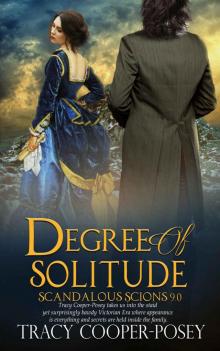 Degree of Solitude
Degree of Solitude Kiss Across Blades
Kiss Across Blades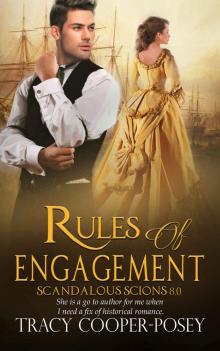 Rules of Engagement
Rules of Engagement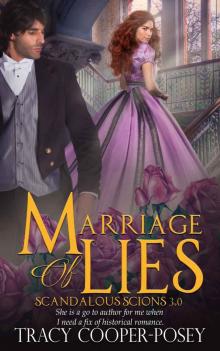 Marriage of Lies
Marriage of Lies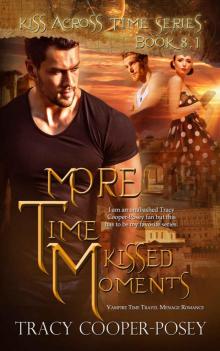 More Time Kissed Moments
More Time Kissed Moments Hunting The Kobra
Hunting The Kobra Black Heart
Black Heart Eva's Last Dance
Eva's Last Dance Solstice Surrender
Solstice Surrender Inconvenient Lover
Inconvenient Lover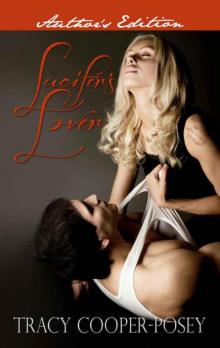 Lucifer's Lover
Lucifer's Lover Wait (Beloved Bloody Time)
Wait (Beloved Bloody Time)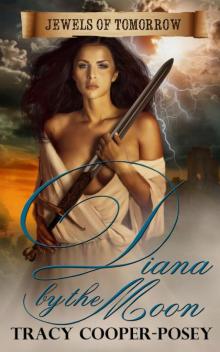 Diana by the Moon
Diana by the Moon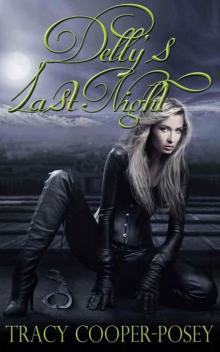 Delly's Last Night (Go Get 'Em Women)
Delly's Last Night (Go Get 'Em Women)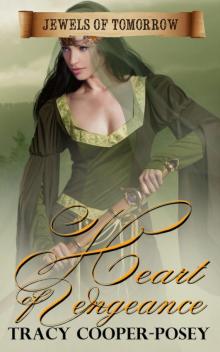 Heart of Vengeance
Heart of Vengeance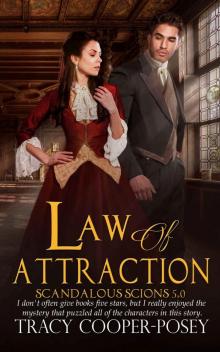 Law of Attraction
Law of Attraction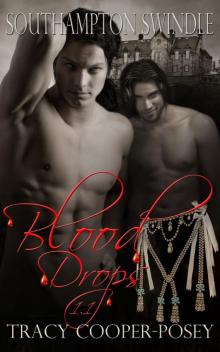 Southampton Swindle
Southampton Swindle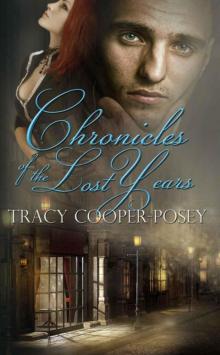 Chronicles of the Lost Years (The Sherlock Holmes Series)
Chronicles of the Lost Years (The Sherlock Holmes Series) V-Day
V-Day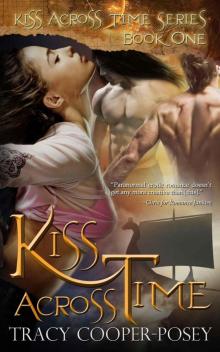 Kiss Across Time (Kiss Across Time Series)
Kiss Across Time (Kiss Across Time Series)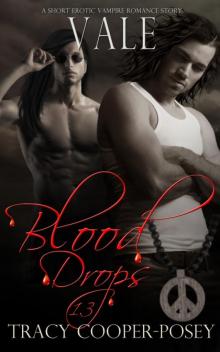 Vale: A Short Erotic Vampire Romance Story
Vale: A Short Erotic Vampire Romance Story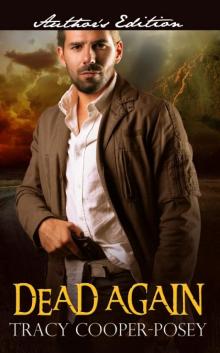 Dead Again: A Romantic Thriller
Dead Again: A Romantic Thriller Dangerous Beauty
Dangerous Beauty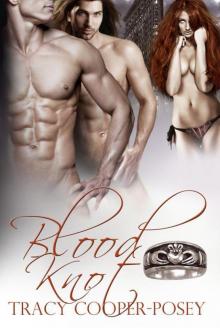 Blood Knot
Blood Knot Vivian's Return
Vivian's Return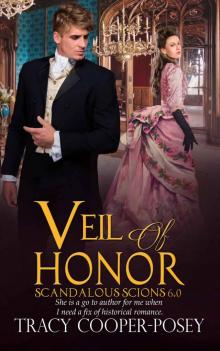 Veil of Honor
Veil of Honor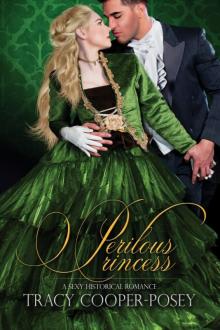 Perilous Princess: A Sexy Historical Romance
Perilous Princess: A Sexy Historical Romance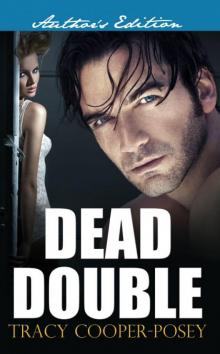 Dead Double
Dead Double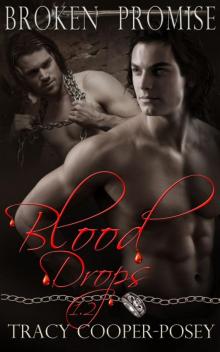 Broken Promise
Broken Promise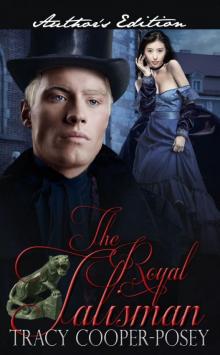 Royal Talisman
Royal Talisman